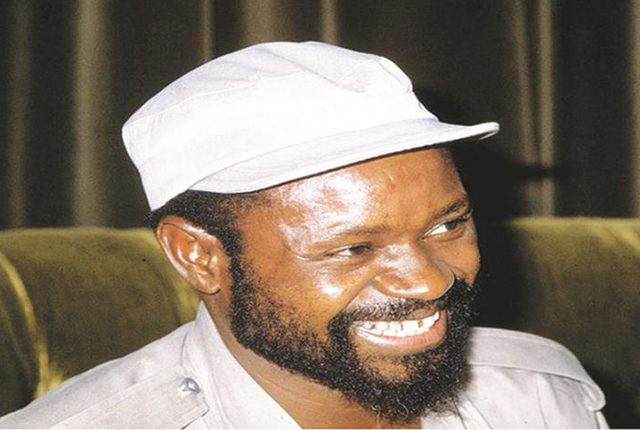Day when Africa lost a son

Thembile Ndabeni Correspondent
The death of Samora Machel on October 19, 1986 marked the saddest day in Mozambique, Africa at large and some other parts of the world. Like most African countries, Mozambique was colonised. It was under the yoke of Portuguese colonialism.The only way out was the formation of a liberation movement.The Front for the Liberation of Mozambique, Frelimo, was formed in 1962 led by an American-educated professor of sociology, Eduardo Mondlane, who was killed by a parcel bomb in 1969 after having made some advances towards the liberation of Mozambique.
The question of who to succeed him was a big challenge because of his calibre, character, expertise and education. Therefore Samora Machel faced a big challenge of succeeding such a heavyweight.The charismatic and committed Machel filled the gap left by Mondlane. He fought tirelessly during the war, capturing strategic points such as Caho Delgado.
The new Portuguese government handed over administration to the people. It meant the freedom of Mozambique.After independence in 1975, Mozambique was confronted by many challenges. One was the fierce opposition and destabilisation by Renamo, a reactionary formation created by Ian Smith, the Rhodesian prime minister, supported by South Africa and other reactionary forces or elements to destabilise the newly established Marxist-Leninist state of Mozambique.
Machel was punished for supporting the liberation movements fighting to free Rhodesia (Zimbabwe) and South Africa. Smith was settling scores against Machel for backing the liberation struggle in Rhodesia. South Africa did the same. His crime against the illegitimate white minority apartheid regime was supporting the ANC.
Mozambique was not immune from destabilisation and raids by the apartheid regime. Economic sanctions and other penalties were applied against Machel’s government.Another method was making the Southern African Development Coordination Conference, later the Southern African Development Community, ineffective by destabilising it while the apartheid regime was the powerhouse in southern Africa.
The little infrastructure Mozambique had was wiped out, at least 1 000 000 people were killed while 7 000 000 became refugees. There is no country in southern Africa that suffered the way Mozambique under Samora Machel did for opposing white minority rule.
He was ultimately forced to sign the Nkomati Accord with the apartheid regime on March 16, 1984. The accord was a passage of the constellation of southern African states programme to defeat a “Marxist threat”.
Many are still not convinced Machel had no choice other than letting the country suffer further. He was a frontline leader who wanted a leadership change in the liberation struggle of Zimbabwe in favour of the conformists and moderates against the true revolutionaries.He also encouraged Robert Mugabe to accept Lord Carrington’s (former conservative foreign secretary from Britain) deceptive terms in the negotiated settlement for Zimbabwe’s independence. Sometimes it was because of pressure including attacks from Renamo and South Africa.
He once praised British prime minister Margaret Thatcher for being “the best prime minister for 15 years because she had the courage to solve the Rhodesian problem”. Machel said: “Our aims for Zimbabwe were the same. It was just our tactics that differed”. He would alter his stance after pressure and realising his mistake.
He could be firm under hard conditions. The Bantustans did not attend the Nkomati Accord because of his refusal to recognise them. The Nkomati Accord did not prove to be a solution as his government was still not safe from Renamo.There were published claims that senior officers within the SADF were subverting their own government’s relations with Machel by intriguing with Renamo.
Machel’s government was not safe from the Western bloc due to its Marxist-Leninist ideology. Machel, a head of state and a frontline states activist, died on his way from the frontline states meeting in a plane crash in Mbuzini on the border between South Africa and Mozambique, along with 33 others, including ministers and other officials of the Mozambican government.
Machel might be gone, but his legacy and works still reverberate in the minds of many, regardless of being forced to sign the Nkomati Accord and to keep the ANC out of Mozambique.Assisting the ANC and Zimbabwean African National Union’s struggle meant contributing to the cause of the South African, Zimbabwean liberation and the entire Africa.
In that regard it is understandable that after Zimbabwe was free and seeing Renamo’s continuation as an obstacle in Mozambique, Mugabe said: “I will fight Renamo until the last man”. When referred to as the Che Guevera of Africa, Machel would say: “I am not Che Guevera of Africa, I am Machel of Mozambique”.
The apartheid regime denied having a hand in his death. Now, 30 years later, his death is still a mystery.How can the family have closure without knowing the truth? How must Africa be healed if her son’s death remains unsolved until now? How must the progressive forces around the world accept the unknown death of their own?
People such as Joaquim Chissano pointed fingers at apartheid South Africa because it breached the agreement and continued supporting Renamo. Machel was coming from the meeting of the frontline states which antagonised South Africa.He died mysteriously on South African soilInvestigations and commissions have been set up, but all those efforts did not yield results, but one day! — ANN7.







Comments